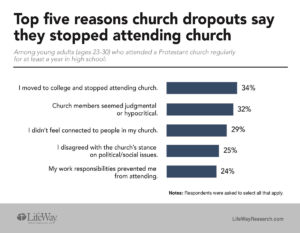By: Griffin Paul Jackson – christianitytoday.com – January 15, 2019
Slightly fewer young adults are dropping out of church after high school, but those who do have more serious reasons for leaving than a decade ago.
In a 2017 LifeWay Research survey released today, 66 percent of Americans between 23 and 30 years old said they stopped attending church on a regular basis for at least a year after turning 18, compared to 70 percent in 2007.
Most young churchgoers skip out on Sundays at some point amid their transition to going to college, moving away from home, or starting their first jobs. LifeWay has found that historically about two-thirds of dropouts return to services once they get older.
But these days, young Christians are more likely to cite weightier political and spiritual concerns as pushing them away from the church, with 70 percent listing such beliefs as a reason for their departure in 2017 compared to about half (52%) 10 years before.
Moving for college remains the top reason young people stop attending church in both surveys, which are based on responses from more than 2,000 young Americans who attended a Protestant church regularly (twice a month or more) for at least a year during high school.

Other popular reasons to include: a perception that church members were hypocritical (32%), disconnect with church life (29%), and lack of student ministry opportunities (24%).
Political rifts between young Christians and their congregations are growing. A quarter (25%) of recent dropouts said disagreements over their church’s stance on political and social issues contributed to their decision to stop attending, compared to 15 percent in 2007.
The follow-up survey came in the wake of the 2016 elections, with partisan divides over President Donald Trump’s victory adding to Generation Z’s growing concerns around race, social justice, and LGBT rights.
“In the past, it was possible for difficult issues like this to be brushed aside or go unaddressed entirely,” Ben Trueblood, director of student ministry for LifeWay Christian Resources, told CT last year, responding to trends among Gen Z. “But that approach cripples the purpose of student ministry. Now, student ministry leaders are forced to teach what the Bible says on these issues, as well as equip teenagers to respond biblically.”
In a time when many churches are “predictable clusters of the politically like-minded,” as James K. A. Smith has said, it’s harder for those who feel like ideological outliers to stick around. As CT reported last year, church attendance dipped among born-again and evangelical Christians across age groups after Trump’s election, particularly among Hillary Clinton supporters, who may have not felt welcome in certain church contexts.
Young people—some temporarily and some permanently—are moving outside churches to find a cohort that shares their political and spiritual beliefs. After high school, many find that community on campus.
A quarter of 18- to 22-year-olds in 2007 and a third in 2017 said they stopped attending church regularly simply because they “moved to college.” (Among young adults who had enrolled in college, that number is up to nearly half—47 percent.)
Still, only 14 percent said their school obligations actually kept them away from church, compared to 24 percent that said their work responsibilities prevented them from going.
Other studies have noted a clear correlation between college attendance and decreased religiosity but find the decline in faith isn’t the fault of professors or classes themselves. Rather, it may be due to the “college experience” more broadly or the transition from one’s family home to a new independence. There is also plain teenage amnesia.
“It’s not that most rejected the church,” wrote Ed Stetzer, former executive director of LifeWay Research and the current head of the Billy Graham Center at Wheaton College. “For the most part, they simply lose track of the church and stop seeing it as important to their life.”
Of those who dropped out of church for at least a year during the college years (between ages 18 and 22), more of them—31 percent—now attend regularly than those who never returned—29 percent.
LifeWay reports that church attendance peaks at age 15, with more than three-quarters regularly attending then. But that percentage took a nosedive at 18, and by 19, only 4 in 10 former regular-attenders were still in the habit. By 21, one-third attended church services regularly—a percentage that remained constant through age 30.
The dynamics of churches themselves are increasingly a turnoff for dropouts. In 2007, half (55%) pointed to church- and pastor-related reasons as important in their decision to leave—mostly their impressions of their place in the congregation. But in 2017, 73 percent indicated such grievances were a factor in stepping away.
Just as earlier research by Fuller Youth Institute concluded that young people don’t want hip pastors, matters of worship and preaching were not dominant factors inspiring young people to leave. LifeWay found that only 13 percent said they left because the worship style was “unappealing,” and 1 in 10 said they left because “the sermons were not relevant to my life.”

The percentage of those who said they wanted to keep attending church but dropped out because they were “too busy” actually decreased in the decade between surveys (22% in 2007 versus 20% in 2017).
To see the remainder of this article, click read more.
Source: The Top Reasons Young People Drop Out of Church…… | News & Reporting | Christianity Today
 Listen Online
Listen Online Watch Online
Watch Online Find a Station in Your Area
Find a Station in Your Area









 Listen Now
Listen Now Watch Online
Watch Online
